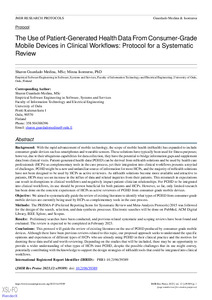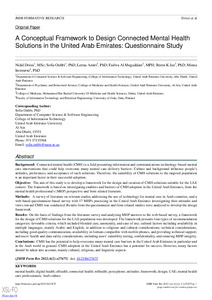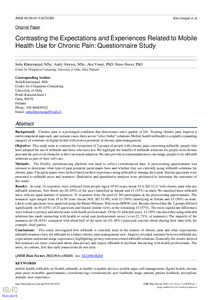The use of patient-generated health data from consumer-grade mobile devices in clinical workflows : protocol for a systematic review
Guardado Medina, Sharon; Isomursu, Minna (2023-02-27)
Guardado Medina S, Isomursu M. The Use of Patient-Generated Health Data From Consumer-Grade Mobile Devices in Clinical Workflows: Protocol for a Systematic Review. JMIR Res Protoc 2023;12:e39389. URL: https://www.researchprotocols.org/2023/1/e39389. DOI: 10.2196/39389
© Sharon Guardado Medina, Minna Isomursu. Originally published in JMIR Research Protocols (https://www.researchprotocols.org), 27.02.2023. This is an open-access article distributed under the terms of the Creative Commons Attribution License (https://creativecommons.org/licenses/by/4.0/), which permits unrestricted use, distribution, and reproduction in any medium, provided the original work, first published in JMIR Research Protocols, is properly cited. The complete bibliographic information, a link to the original publication on https://www.researchprotocols.org, as well as this copyright and license information must be included.
https://creativecommons.org/licenses/by/4.0/
https://urn.fi/URN:NBN:fi-fe2023081094703
Tiivistelmä
Abstract
Background: With the rapid advancement of mobile technology, the scope of mobile health (mHealth) has expanded to include consumer-grade devices such as smartphones and wearable sensors. These solutions have typically been used for fitness purposes; however, due to their ubiquitous capabilities for data collection, they have the potential to bridge information gaps and supplement data from clinical visits. Patient-generated health data (PGHD) can be derived from mHealth solutions and be used by health care professionals (HCPs) as complementary tools in the care process, yet their integration into clinical workflows presents a myriad of challenges. PGHD might be a new and unfamiliar source of information for most HCPs, and the majority of mHealth solutions have not been designed to be used by HCPs as active reviewers. As mHealth solutions become more available and attractive to patients, HCPs may see an increase in the influx of data and related inquiries from their patients. This mismatch in expectations can result in disruptions to clinical workflows and negatively impact patient-clinician relationships. For PGHD to be integrated into clinical workflows, its use should be proven beneficial for both patients and HCPs. However, so far, only limited research has been done on the concrete experiences of HCPs as active reviewers of PGHD from consumer-grade mobile devices.
Objective: We aimed to systematically guide the review of existing literature to identify what types of PGHD from consumer-grade mobile devices are currently being used by HCPs as complementary tools in the care process.
Methods: The PRISMA-P (Preferred Reporting Items for Systematic Review and Meta-Analysis Protocols) 2015 was followed for the design of the search, selection, and data synthesis processes. Electronic searches will be done on PubMed, ACM Digital Library, IEEE Xplore, and Scopus.
Results: Preliminary searches have been conducted, and previous related systematic and scoping reviews have been found and evaluated. The review is expected to be completed in February 2023.
Conclusions: This protocol will guide the review of existing literature on the use of PGHD produced by consumer-grade mobile devices. Although there have been previous reviews related to this topic, our proposed approach seeks to understand the specific opinions and experiences of different types of HCPs who are already using PGHD in their clinical practice and the motives for deeming these data useful and worth reviewing. Depending on the studies that will be included, there may be an opportunity to provide a wider understanding of what types of HCPs trust PGHD, despite the possible challenges that its use might convey, potentially contributing with the knowledge to support the design strategies of mHealth tools that could be integrated into clinical workflows.
Kokoelmat
- Avoin saatavuus [32331]
Samankaltainen aineisto
Näytetään aineisto, joilla on samankaltaisia nimekkeitä, tekijöitä tai asiasanoja.
-
A conceptual framework to design connected mental health solutions in the United Arab Emirates : questionnaire study
Drissi, Nidal; Ouhbi, Sofia; Amiri, Leena; Al Mugaddam, Fadwa; Jan, Reem K; Isomursu, Minna
JMIR formative research : 2 (JMIR Publications, 07.02.2022) -
Contrasting the expectations and experiences related to mobile health use for chronic pain : questionnaire study
Kheirinejad, Saba; Alorwu, Andy; Visuri, Aku; Hosio, Simo
JMIR human factors : 3 (JMIR Publications, 06.09.2022) -
Exploring mHealth applications for self-management of chronic low back pain : a survey of features and benefits
Kheirinejad, Saba; Visuri, Aku; Suryanarayana, Sharadhi Alape; Hosio, Simo
Heliyon : 6 (Elsevier, 06.06.2023)




